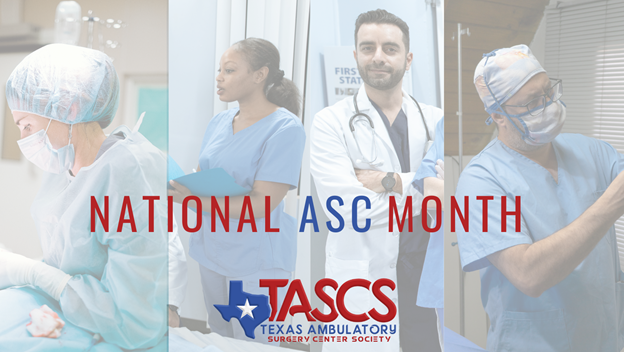
Ambulatory surgery centers have been around since 1970, and National ASC Month is celebrated each year in August. During this time, facilities can boost awareness and help inform more people about the benefits of ASCs.

Ambulatory surgery centers have been around since 1970, and National ASC Month is celebrated each year in August. During this time, facilities can boost awareness and help inform more people about the benefits of ASCs.
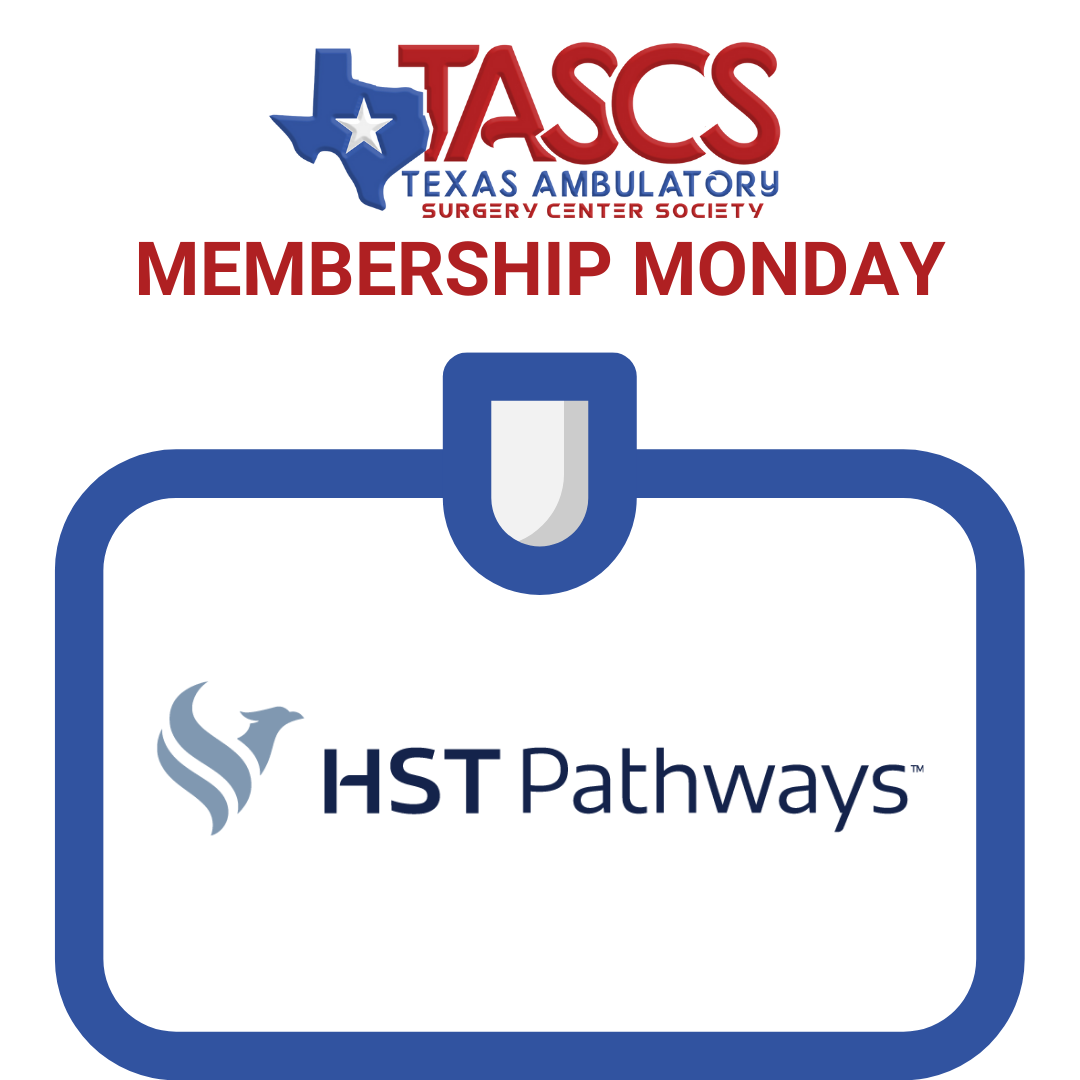 Robert Marinich is the head of sales at HST Pathways and has been working there for almost 10 years. During this time, he has fallen in love with the job and feels blessed to wake up every day, getting to help the healthcare industry with efficiency, cost-savings and so much more. “We care less about the politics and more about the client,” Marinich said. “And this client-first mentality is key to success.”
Robert Marinich is the head of sales at HST Pathways and has been working there for almost 10 years. During this time, he has fallen in love with the job and feels blessed to wake up every day, getting to help the healthcare industry with efficiency, cost-savings and so much more. “We care less about the politics and more about the client,” Marinich said. “And this client-first mentality is key to success.”
HST Pathways offers technological solutions and innovations for ambulatory surgery centers through several programs: case coordination, practice management and electronic health records. These programs work in tandem to create the ultimate experience for patient caregivers, and these three services bundled together computerize every step of the process to make for a more efficient facility that allows caregivers to spend more time with the patients and less time charting.
Facing a pandemic over this past year has been a whirlwind for the healthcare industry. Throughout all the problems that arose, though, people began to step up and go above and beyond in their healthcare roles. The Texas Ambulatory Surgery Center Society sent out a survey to find out who members believe are emerging leaders in the surgery center community … caregivers and administrators alike, who truly stepped up and shined in their roles.
Three administrators stood out to the TASCS members as emerging leaders in the world of ambulatory care.
On June 24, Laura Schneider, the senior clinical director at AMSURG, explained some key issues and tips for running drills in ambulatory surgery centers. With over 40 years of experience in the healthcare industry, Schneider has dealt with most situations for which these drills are built to help staff be ready.
One of the biggest differences between hospitals and surgery centers is the amount of resources they have, so when ASCs are preparing for potential emergencies, it’s important that they allocate their resources and staff effectively. “There’s not always extra people around, so you’ve got to use your resources wisely,” Schneider said. “You want to make sure you’re prepared.”
After over a year of virtual meetings during the pandemic, the Texas Ambulatory Surgery Center Society got back to in-person events on June 23. The event, held at Austin Eastciders, was the first stop on TASCS’s Member Networking Texas Tour, which safely helps the healthcare community network.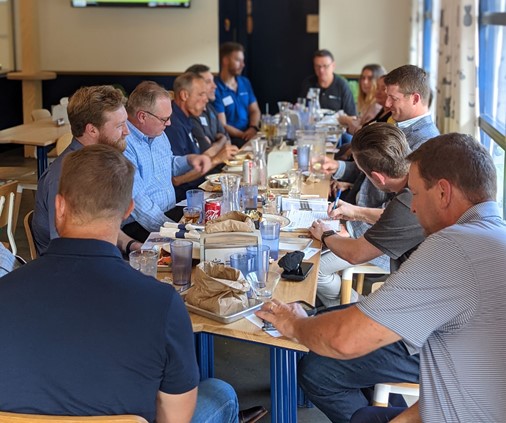
In attendance was Woody Moore, the founder of this organization, who said he was proud of TASCS executive director Krista DuRapau’s hard work towards keeping the society relevant during the pandemic. “Many advocacy organizations have not survived so (DuRapau’s) work and that of (TASCS’s) board going forward is immensely important,” Moore said. “Now in its 50th year, the ASC sector is once again in an aggressive growth phase with a number of models in play.”
On June 10, Bob Marinich, head of sales for HST Pathways, talked to Texas Ambulatory Surgery Center Society members about implementing electronic health records successfully in their surgery centers.
In the past, EHRs received a bad name because they were slow and hard to use, Marinich said. They were designed by programmers rather than the people who would be using them. Today, though, EHRs are significantly better, due to technological advancements and an increasing understanding of healthcare needs. Still, less than 10% of ASCs are utilizing EHRs. This is in part due to their poor history but also because these programs are not subsidized and have no CMS guidelines.
It is the 25th anniversary of National Safety Month. Since 1996, the National Safety Council has brought awareness to safety issues and encouraged everyone to help others stay safe, whether it be at the workplace or anywhere else.
This year holds special value to the safety of the nation, because our country only recently started to recover from a pandemic that devastated all aspects of our lives and flipped the medical industry on its head, as everyone struggled to adapt to the rapidly changing environment. Centers were shut down, people were overworked, and supplies were constantly in shortage.
|
||||||
|
||||||
|
The Texas Ambulatory Surgery Center Society has a new board member: Jeff Blankinship!
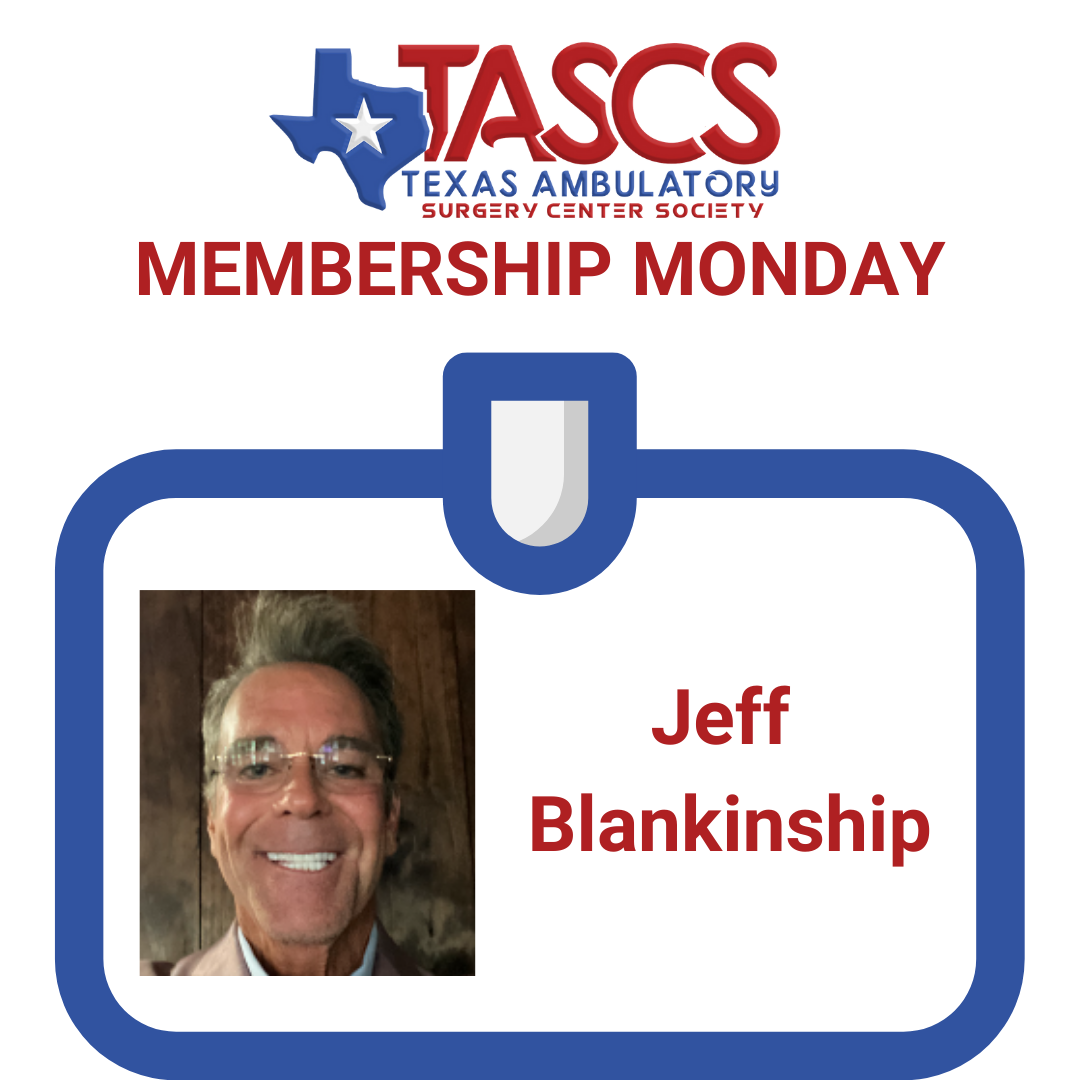
Bartt Warner, director of compensation arrangements at VMG Health, and Dylan Alexander, manager for business valuation and transaction advisory at VMG Health, presented information to Texas Ambulatory Surgery Center Society members on May 27 about fair market value in the surgical center industry, as well as an Office of Inspector General opinion that speaks directly to ASC investment concerns.
VMG Health is a company that specializes in healthcare valuation, strategy and compliance. The company provides fair market value on all assets of the medical field, from equipment to physician salaries, and has developed experts to look at each component of the industry to satisfy customers’ total needs. It also helps with tailoring a compliance program specific to your organization that will ensure compliance with Center for Medicare and Medicaid Services, as well as other governmental regulations.
The History & The Future Of Ambulatory Surgery Centers
According to Texas Health & Human Services, there are 560 ambulatory surgery centers (ASCs) — medical facilities specialized in elective, same-day and outpatient surgical procedures — in Texas.
On May 13, Dr. David Shapiro, an officer for the Accreditation Association for Ambulatory Health Care (AAAHC), spoke to Texas Ambulatory Surgery Center Society members about the survey process and steps ASCs can take in preparation for their surveys.
When it comes to AAAHC’s approach, Shapiro explained the surveyors work to be consultants with facility staff and collaborate with them to ensure they become accredited and are able to keep that status. “A lot of our standards are very open-ended,” he said. “We ask you to define things.” For example, pediatrics could mean something different for every center, and some centers might not even have pediatric departments, so it’s up to the facility to define what they have and what the cut-offs are for their departments.
In April, the Texas Health and Human Services Commission answered some questions from the Texas Ambulatory Surgery Center Society about survey updates, rule changes and other helpful resources for ASCs.
As it pertains to surveys, HHSC is not authorized to do any virtual surveys at this time, and in-person visits are expected to meet the established expectations for infection control. All visits for surveys are addressed on a case-by-case basis. When it comes to the top survey citation since COVID, the staff expressed that surveyors have a special focus on infection control practices throughout all CMS-certified providers.
April 26 to April 30, the Texas Ambulatory Surgery Center Society hosted Infection Control Week. This virtual conference brought together industry experts, discussing the initiatives, expectations and future of infection prevention in ambulatory surgery centers.
On Monday, Lisa McKown, the manager of research and development for Beyond Clean, spoke about public health initiatives to reduce healthcare-associated infections and offered helpful ways the community can get involved to prevent HAIs.
STERIS Associates Discuss Outsourcing Sterilization Process to Prevent Infection
By Tara Phipps
On Thursday, April 22, two STERIS associates discussed offsite reprocessing centers and issues ambulatory surgery centers face with vendor trays at the bi-weekly Texas Ambulatory Surgery Center Society town hall event.
This year, in particular, keep in mind all that those in the field of nursing do for the world.
May 6 to May 12 is National Nurses Week, a week that many of us can relate to, as we each have stories and personal experiences regarding the dedication of nurses. A nurse myself, I first obtained my LVN license at 19 through the Army. Since, I have worked in skilled rehab, general surgery, telemetry, cardiac stepdown, IMCU, trauma ICU, PACU, PREOP, extended care and the operating room, as well as as a safety officer, director of nursing (ASC), nurse administrator (ASC), ASC developer and consultant. Nursing has taken me to places and offered me the opportunity to meet and help people that I could never have imagined.
Last week, the Texas Ambulatory Surgery Center Society (TASCS) held its bi-annual Capitol Day virtually. The event was a success that included meetings with a focus group of ambulatory surgery center (ASC) members and various legislative offices, including a welcome kick-off from Senator Dawn Buckingham, MD herself.
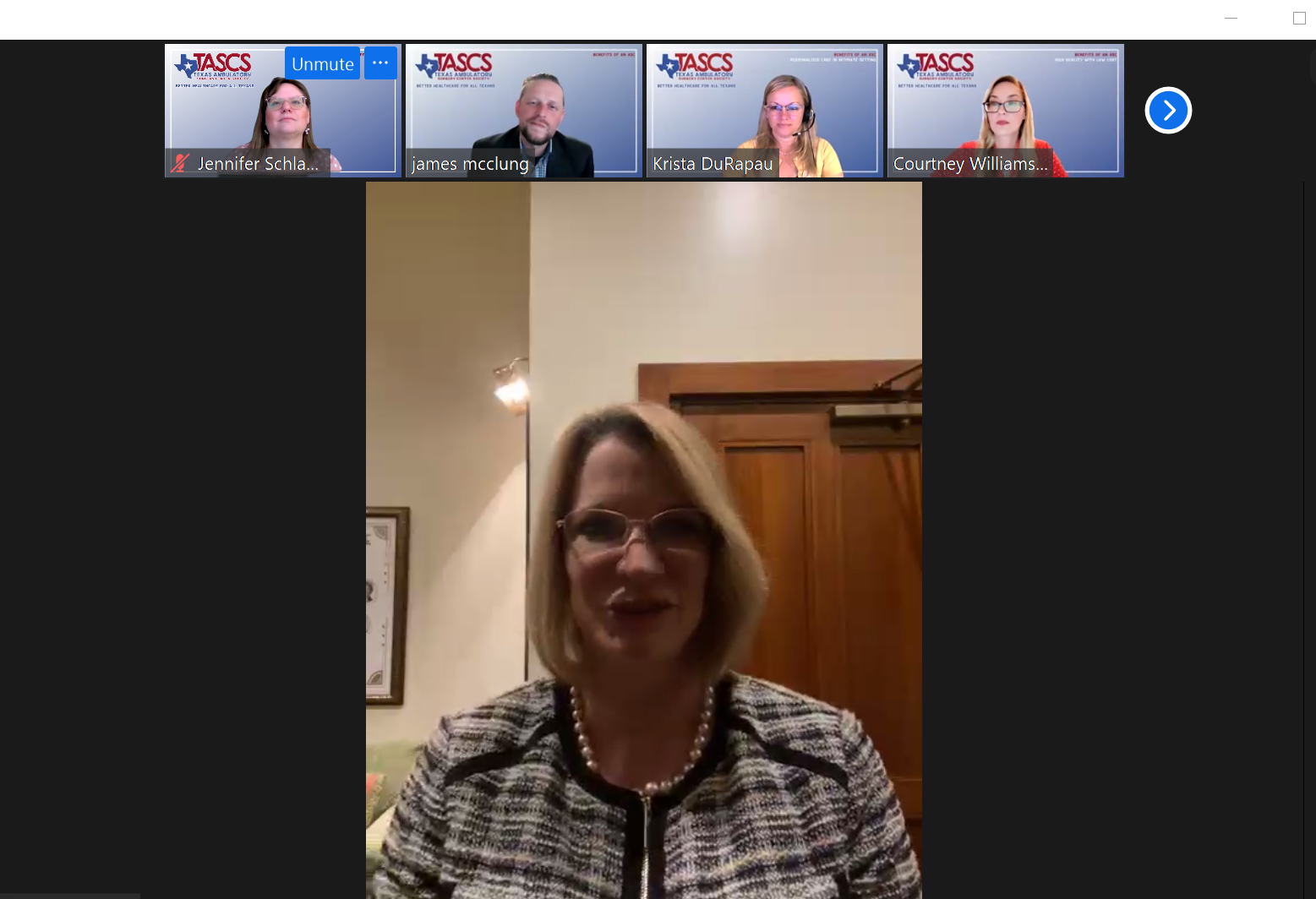
At one time it might have been surprising to find out that an Ambulatory Surgery Center (ASC) functioned without an in-house Sterile Processing Department (SPD). Today, it's common to see centers survive and even thrive without them.
TASCS testifies at the Capitol supporting SB 1763 by Sen. Drew Springer, adding an ASC Representative to the Governor’s EMS and Trauma Advisory Council (GETAC)
On Tuesday, April 13, 2021, Krista DuRapau, Executive Director for Texas Ambulatory Surgery Center Society, and Steve Blom, Administrator Texas Orthopedics Surgery Center and past TASCS Board Member, testified to the Texas Senate in support of SB 1763 by Sen. Drew Springer which adds an ASC representative to the Governor’s EMS and Trauma Advisory Council (GETAC). HB 3605 by Rep. John Turner is the House companion.
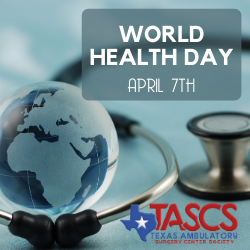
This World Health Day, What Are You Doing To Build A Fairer, Healthier World?
By TASCS Board Member James McClung, Chief Development Officer of Reliant Medical Services